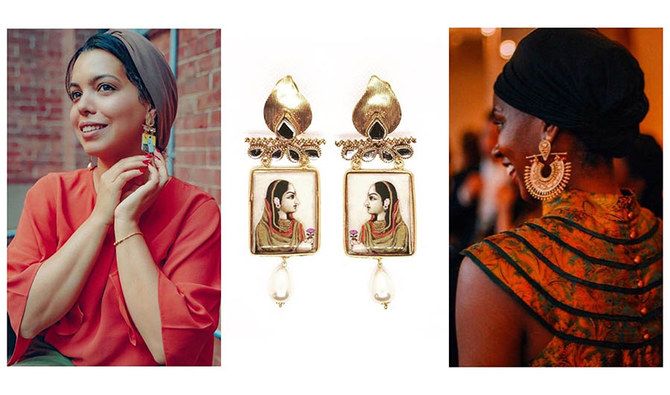ISLAMABAD: On the webpage of Pakistani jewelry house ‘Pierre Gemme,’ the brand is described as an enterprise profiling the stories of extraordinary women. With its unique brand image, the business, founded by three sisters-- twins Hira and Hajjra and their younger sister Hina Hur, holds an edge over most of its contemporaries.

Hajra, Hira and Hina Hur are the sisters behind Pierre Gemme, a jewellery start-up based out of Islamabad that attempts to tell the stories of extraordinary women through jewellery design. August 12, 2019. (Image via Pierre Gemme Instagram)
Born in Quetta in Pakistan’s southwestern Balochistan province to a civil servant father, who the sisters describe as a “master storyteller,” and a dentist mother, the three sisters embarked on their joint venture in 2017 largely inspired by their life across Pakistan and their travels around the globe-- between them over 75 countries in the past 10 years.
Their travels introduced them to different women from all facets of life they said, which inspired them to want to tell stories, particularly about women. They also credit their father for “unintentionally opening doors for inspiration and creativity for all three of us.”
“Like most South Asian parents, ours wanted us to be doctors or engineers,” said Hira Hur, but added that their creative urges couldn’t stay locked up for long.
Hina Hur initially followed in her mother’s footprints and became a dentist, but acted on her passion for art and design all the while, creating unique earrings.

"Gulestan" draws inspiration from the rose gardens of the Mughal Era as written by a poet of the era, Saadi. The earrings marry traditional aesthetics of South Asian jewelry design with modern-day touches. April 22, 2019 (Image via Pierre Gemme Instagram)
She began sketching and designing graphics of jewelry and brought them to life in 2016, making her first pair at the workshop of the artisans she now works with. She emphasizes on creating designs with history and significance.
“It was not the design alone that was admired, the earrings started a conversation,” Hira said of her sister’s creations.
Their first design, the “Pierre Gemme Signature,” earrings are a tribute to the Mughal empire and have made an international mark for themselves.
“The earrings made it to New York where one of us was working and one earrings’ request from a friend turned to 100 orders... and now we are selling around 10,000 pieces per year,” Hira told Arab News.

"Pursuit of Pleasure" features the portrait of a Mughal era woman. May 4, 2019 (Image via Pierre Gemme Instagram)
Pierre Gemme in French means gemstones, which are an often overlooked part of Pakistan’s offerings to the world.
“The name is an homage to the natural beauty and landscapes of Pakistan. Beneath these landscape lies a whole new world of gemstones and its beauty. While living in Balochistan, we traveled along the silk road and got inspired by the gems each place had to offer. Pakistan is home to emeralds, peridots, aquamarine, Kundun, rubies, topaz, quartz, the list goes on,” Hira said.
“Our brand is more than jewelry,” she said. “It celebrates women who are not typically spoken about but created history through their activism in the early 17th and 18th century.”
“We believe telling and hearing stories is the most powerful means to educate, influence and inspire others,” she continued.
“Stories create connections — they move us and make us feel alive, they challenge and help us understand our place. We are seizing the power of art and combining it with jewelry to incorporate stories of extraordinary women and cultures, typically not well known.”
The sisters research the real-life stories of the women they bring to life in their jewelry and then relay that story in captions on their buzzing Instagram page.

A client, Yemini artist and activist Bushra, wearing the "Kandaka" earrings in Yemen. August 21, 2019. (Image via Pierre Gemme Instagram)
“We go through a thorough research of selecting influential and lesser-known women in history who created movements and achieved something,” said Hira.
“Our piece ‘Umrao Jan’ is inspired by Umrao Jan Ada, an early novel written in the Urdu language about a woman who narrates her tales of self-discovery, using art and poetry,” Hira said. Similarly, she explained, “Kahina is a pre-Islamic female warrior from Morocco’s Berber’s tribe.”
Designs by the sisters also incorporate modern faces of trailblazing women, including Sudanese activist Alaa Salah, who became a recognizable icon of the Sudanese protests in March 2019 when her photograph went viral.
“She inspired and is depicted on ‘Kandaka — the Nubian Queen’ piece. That piece is from an unforgettable vision of a woman dressed in white, standing on top of a car chanting and pointing to the sky as the crowd holds up their hands. Her image defied false ideas of Muslim women as oppressed and being politically passive during the Sudanese revolution.”

A client, Yemini artist and activist Bushra, wearing the "Kandaka" earrings in Yemen. August 21, 2019. (Image via Pierre Gemme Instagram)
The Hur sisters have employed men and women in Lahore to create their original pieces. For them, their women artisans are also a critical part of their story.
“We have five artisans working with us at the moment of which four are women and one is a man. It takes between a month or two to produce the first pair of earrings. After the design is final, all earrings are made by hand and we make about 10 pairs a day on average,” Hira said.
“We noticed that jewelry making is a male-dominated profession,” she added. “It took us a long time to encourage and get women to make jewelry, so we can create better opportunities for women in Pakistan.”
The sisters hope to build up their brand and get the opportunity to employ more people from Pakistan and expand their story-telling around the globe. They will be taking their jewelry to Cairo later this year.
“It will be amazing if we can build a movement of women across the world telling stories through the art of jewelry making,” said Hira. “We would love to grow Pierre Gemme as symbolic jewelry that connects women to their emotions, grace, strength, vulnerability, and sense of humor.”























